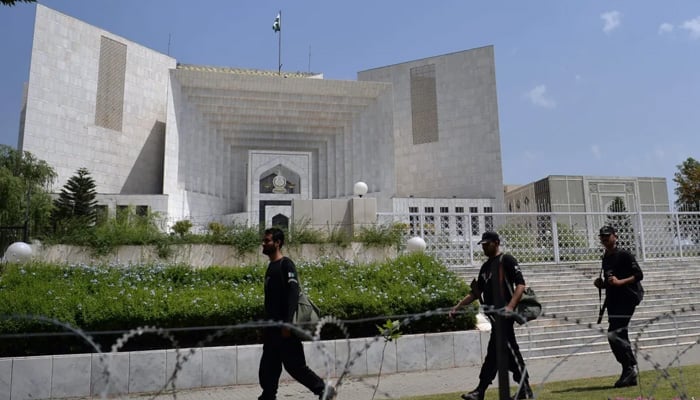Delaying polls undermines public trust: SC
ISLAMABAD: The Supreme Court Wednesday held that it was well-established in democratic systems that general elections were the cornerstone of representative governance, ensuring the people’s right to choose their leaders and influence policy decisions.
A three-member bench of the apex court — headed by the acting Chief Justice Sardar Tariq Masood and comprising Justice Syed Mansoor Ali Shah and Justice Athar Minallah — issued a written order on the delimitation of two constituencies of Shoran and Zhob in Balochistan.
The bench had on December 18 suspended the operation of the order of Balochistan High Court (BHC) regarding delimitation of two provincial constituencies after granting leave to appeal to the Election Commission of Pakistan.
The Balochistan High Court had changed the delimitation of constituencies of the ECP in Shoran and Zhob. The ECP had filed an appeal with the Supreme Court against the decision.
The Election Commission of Pakistan, however, filed an appeal with the apex court against the BHC order.
“The periodic conduct of these elections is not merely a procedural necessity but a fundamental principle upholding the democratic ethos,” says the written order, authored by Justice Syed Mansoor Ali Shah.
The court noted that the delimitation of a constituency, although significant for ensuring fair and effective representation, does not hold the same immediacy or overriding importance as the conduct of general elections.
While this is undoubtedly important for the health of a democratic system, it is not so critical that it should impede the timely conduct of general elections, the court noted in its written order.
The court held that postponing general elections to address constituency delimitation could lead to a vacuum in governance and a potential crisis of legitimacy adding that such a situation would be antithetical to the principles of democracy and the larger good of the populace. Therefore, the court noted, the principle of proportionality and the concept of the larger good demand that general elections be given primacy.
The court further noted that the issues concerning the delimitation of constituencies, while important, should be addressed subsequent to the elections.
The court held that delaying elections or prolonging legal disputes can undermine public confidence in the electoral process and the democratic system as a whole. “It can also create uncertainty and potentially destabilize the political environment”, says the written order.
“Therefore, if we proceed to adjudicate upon the issue of delimitation of the constituencies before us thereby reexamining or altering the notified constituencies by the ECP under challenge, we will invariably upset the timeline of the Election Programme and derail the electoral process already set afoot by the Election Programme announced on 15 December, 2023,” the written order reads.
“Any intervention by us in revisiting the contours of delimitation of a constituency done by the ECP at this stage will open floodgates of similar litigation, resulting in choking the election process,” says the written order.
The court directed that the ECP shall organize and conduct the election in the two constituencies as per the final delimitation notified on 30 November 2023 and in accordance with the Election Programme notified on 15 December 2023.
The controversy as to the delimitation of the two constituencies shall be decided after the elections, only for the purpose of future general elections if conducted on the basis of the population census of 2023, says the written order
The court directed its office to fix this case for hearing after the general elections, 2024 are over.
-
 Pistons Vs Hornets Recap: Brawl Erupts With 4 Players Getting Tossed Before Detroit Victory
Pistons Vs Hornets Recap: Brawl Erupts With 4 Players Getting Tossed Before Detroit Victory -
 Gordie Howe Bridge Faces Uncertainty After Trump Warning To Canada
Gordie Howe Bridge Faces Uncertainty After Trump Warning To Canada -
 Air Canada’s Flights To Cuba Halted As As Aviation Fuel Crisis Worsens
Air Canada’s Flights To Cuba Halted As As Aviation Fuel Crisis Worsens -
 Marc Anthony Weighs In On Beckham Family Rift
Marc Anthony Weighs In On Beckham Family Rift -
 New Guest Host Announced For The Kelly Clarkson Show
New Guest Host Announced For The Kelly Clarkson Show -
 Why Prince William’s Statement Over Jeffrey Epstein ‘says A Lot’
Why Prince William’s Statement Over Jeffrey Epstein ‘says A Lot’ -
 Paul McCrane Reveals Why Playing Jerks Became His Calling Card
Paul McCrane Reveals Why Playing Jerks Became His Calling Card -
 Prince William, Kate Middleton Thrashed For Their ‘bland’ Epstein Statement
Prince William, Kate Middleton Thrashed For Their ‘bland’ Epstein Statement -
 Bad Bunny Stunned Jennifer Grey So Much She Named Dog After Him
Bad Bunny Stunned Jennifer Grey So Much She Named Dog After Him -
 Kim Kardashian's Plans With Lewis Hamilton After Super Bowl Meet-up
Kim Kardashian's Plans With Lewis Hamilton After Super Bowl Meet-up -
 Prince William Traumatised By ‘bizarre Image’ Uncle Andrew Has Brought For Royals
Prince William Traumatised By ‘bizarre Image’ Uncle Andrew Has Brought For Royals -
 David Thewlis Gets Candid About Remus Lupin Fans In 'Harry Potter'
David Thewlis Gets Candid About Remus Lupin Fans In 'Harry Potter' -
 Cardi B And Stefon Diggs Spark Breakup Rumours After Super Bowl LX
Cardi B And Stefon Diggs Spark Breakup Rumours After Super Bowl LX -
 Alix Earle And Tom Brady’s Relationship Status Revealed After Cosy Super Bowl 2026 Outing
Alix Earle And Tom Brady’s Relationship Status Revealed After Cosy Super Bowl 2026 Outing -
 Why King Charles Has ‘no Choice’ Over Andrew Problem
Why King Charles Has ‘no Choice’ Over Andrew Problem -
 Shamed Andrew Wants ‘grand Coffin’ Despite Tainting Nation
Shamed Andrew Wants ‘grand Coffin’ Despite Tainting Nation




